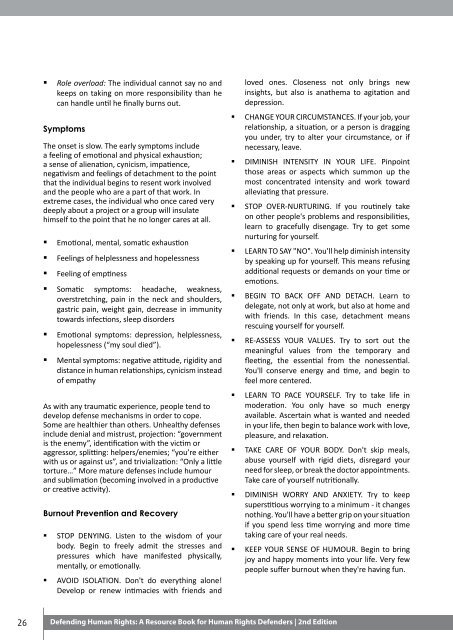Defending Human Rights: A Resource Book for Human
Defending Human Rights: A Resource Book for Human
Defending Human Rights: A Resource Book for Human
Create successful ePaper yourself
Turn your PDF publications into a flip-book with our unique Google optimized e-Paper software.
• Role overload: The individual cannot say no and<br />
keeps on taking on more responsibility than he<br />
can handle until he finally burns out.<br />
Symptoms<br />
The onset is slow. The early symptoms include<br />
a feeling of emotional and physical exhaustion;<br />
a sense of alienation, cynicism, impatience,<br />
negativism and feelings of detachment to the point<br />
that the individual begins to resent work involved<br />
and the people who are a part of that work. In<br />
extreme cases, the individual who once cared very<br />
deeply about a project or a group will insulate<br />
himself to the point that he no longer cares at all.<br />
• Emotional, mental, somatic exhaustion<br />
• Feelings of helplessness and hopelessness<br />
• Feeling of emptiness<br />
• Somatic symptoms: headache, weakness,<br />
overstretching, pain in the neck and shoulders,<br />
gastric pain, weight gain, decrease in immunity<br />
towards infections, sleep disorders<br />
• Emotional symptoms: depression, helplessness,<br />
hopelessness (“my soul died”).<br />
• Mental symptoms: negative attitude, rigidity and<br />
distance in human relationships, cynicism instead<br />
of empathy<br />
As with any traumatic experience, people tend to<br />
develop defense mechanisms in order to cope.<br />
Some are healthier than others. Unhealthy defenses<br />
include denial and mistrust, projection: “government<br />
is the enemy”, identification with the victim or<br />
aggressor, splitting: helpers/enemies; “you’re either<br />
with us or against us”, and trivialization: “Only a little<br />
torture…” More mature defenses include humour<br />
and sublimation (becoming involved in a productive<br />
or creative activity).<br />
Burnout Prevention and Recovery<br />
• STOP DENYING. Listen to the wisdom of your<br />
body. Begin to freely admit the stresses and<br />
pressures which have manifested physically,<br />
mentally, or emotionally.<br />
• AVOID ISOLATION. Don't do everything alone!<br />
Develop or renew intimacies with friends and<br />
loved ones. Closeness not only brings new<br />
insights, but also is anathema to agitation and<br />
depression.<br />
• CHANGE YOUR CIRCUMSTANCES. If your job, your<br />
relationship, a situation, or a person is dragging<br />
you under, try to alter your circumstance, or if<br />
necessary, leave.<br />
• DIMINISH INTENSITY IN YOUR LIFE. Pinpoint<br />
those areas or aspects which summon up the<br />
most concentrated intensity and work toward<br />
alleviating that pressure.<br />
• STOP OVER-NURTURING. If you routinely take<br />
on other people's problems and responsibilities,<br />
learn to gracefully disengage. Try to get some<br />
nurturing <strong>for</strong> yourself.<br />
• LEARN TO SAY "NO". You'll help diminish intensity<br />
by speaking up <strong>for</strong> yourself. This means refusing<br />
additional requests or demands on your time or<br />
emotions.<br />
• BEGIN TO BACK OFF AND DETACH. Learn to<br />
delegate, not only at work, but also at home and<br />
with friends. In this case, detachment means<br />
rescuing yourself <strong>for</strong> yourself.<br />
• RE-ASSESS YOUR VALUES. Try to sort out the<br />
meaningful values from the temporary and<br />
fleeting, the essential from the nonessential.<br />
You'll conserve energy and time, and begin to<br />
feel more centered.<br />
• LEARN TO PACE YOURSELF. Try to take life in<br />
moderation. You only have so much energy<br />
available. Ascertain what is wanted and needed<br />
in your life, then begin to balance work with love,<br />
pleasure, and relaxation.<br />
• TAKE CARE OF YOUR BODY. Don't skip meals,<br />
abuse yourself with rigid diets, disregard your<br />
need <strong>for</strong> sleep, or break the doctor appointments.<br />
Take care of yourself nutritionally.<br />
• DIMINISH WORRY AND ANXIETY. Try to keep<br />
superstitious worrying to a minimum - it changes<br />
nothing. You'll have a better grip on your situation<br />
if you spend less time worrying and more time<br />
taking care of your real needs.<br />
• KEEP YOUR SENSE OF HUMOUR. Begin to bring<br />
joy and happy moments into your life. Very few<br />
people suffer burnout when they're having fun.<br />
26<br />
<strong>Defending</strong> <strong>Human</strong> <strong>Rights</strong>: A <strong>Resource</strong> <strong>Book</strong> <strong>for</strong> <strong>Human</strong> <strong>Rights</strong> Defenders | 2nd Edition








